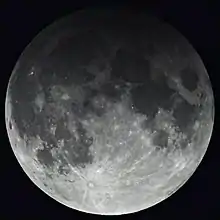July 1981 lunar eclipse
A partial lunar eclipse took place on Friday, July 17, 1981, the second of two lunar eclipses in 1981. The Earth's shadow on the Moon was clearly visible in this eclipse, with 55% of the Moon in shadow; the partial eclipse lasted for 2 hours and 43 minutes.[1]
| Partial eclipse | |||||||||||||
| Date | 17 July 1981 | ||||||||||||
|---|---|---|---|---|---|---|---|---|---|---|---|---|---|
| Gamma | 0.70454 | ||||||||||||
| Magnitude | 0.54860 | ||||||||||||
| Saros cycle | 119 (60 of 83) | ||||||||||||
| Partiality | 163 minutes, 15 seconds | ||||||||||||
| Penumbral | 319 minutes, 43 seconds | ||||||||||||
| |||||||||||||
Visibility
The partial phase of this lunar eclipse was visible in southeastern North America, South America, western Africa, seen rising over northern North America, and setting over Western Europe and Eastern Africa.

Related lunar eclipses
Eclipses in 1981
- A penumbral lunar eclipse on Tuesday, 20 January 1981.
- An annular solar eclipse on Wednesday, 4 February 1981.
- A partial lunar eclipse on Friday, 17 July 1981.
- A total solar eclipse on Friday, 31 July 1981.
Lunar year series
| Lunar eclipse series sets from 1980–1984 | ||||||||
|---|---|---|---|---|---|---|---|---|
| Descending node | Ascending node | |||||||
| Saros | Date Viewing |
Type Chart |
Gamma | Saros | Date Viewing |
Type Chart |
Gamma | |
| 109 | 1980 Jul 27 |
Penumbral |
1.41391 | 114 | 1981 Jan 20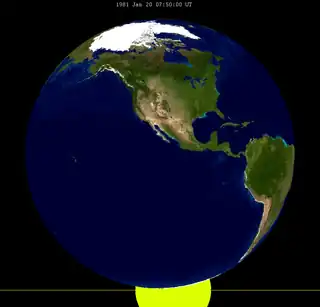 |
Penumbral |
−1.01421 | |
| 119 | 1981 Jul 17 |
Partial |
0.70454 | 124 | 1982 Jan 09 |
Total |
−0.29158 | |
| 129 | 1982 Jul 06 |
Total |
−0.05792 | 134 | 1982 Dec 30 |
Total |
0.37579 | |
| 139 | 1983 Jun 25 |
Partial |
−0.81520 | 144 | 1983 Dec 20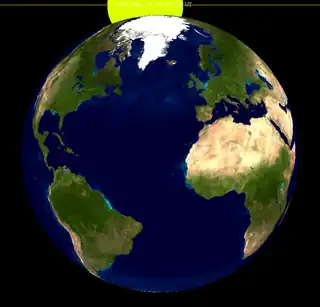 |
Penumbral |
1.07468 | |
| 149 | 1984 Jun 13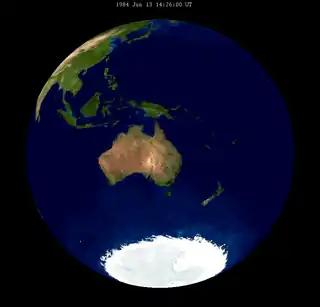 |
Penumbral |
−1.52403 | |||||
| Last set | 1980 Aug 26 | Last set | 1980 Mar 13 | |||||
| Next set | 1984 May 15 | Next set | 1984 Nov 08 | |||||
Saros series
It was part of Saros series 119.
Half-Saros cycle
A lunar eclipse will be preceded and followed by solar eclipses by 9 years and 5.5 days (a half saros).[2] This lunar eclipse is related to two total solar eclipses of Solar Saros 126.
| July 10, 1972 | July 22, 1990 |
|---|---|
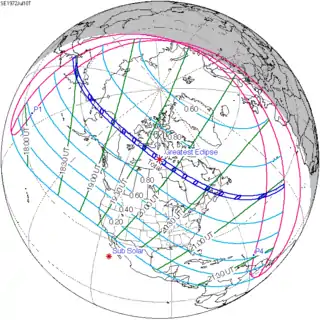 |
 |
Tritos series
- Preceded: Lunar eclipse of August 17, 1970
- Followed: Lunar eclipse of June 15, 1992
Tzolkinex
- Preceded: Lunar eclipse of June 4, 1974
- Followed: Lunar eclipse of August 27, 1988
Notes
- Hermit Eclipse: Saros cycle 119
- Mathematical Astronomy Morsels, Jean Meeus, p.110, Chapter 18, The half-saros
This article is issued from Wikipedia. The text is licensed under Creative Commons - Attribution - Sharealike. Additional terms may apply for the media files.
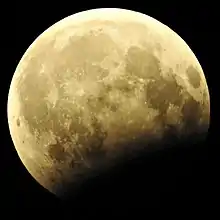
_(cropped).jpg.webp)
